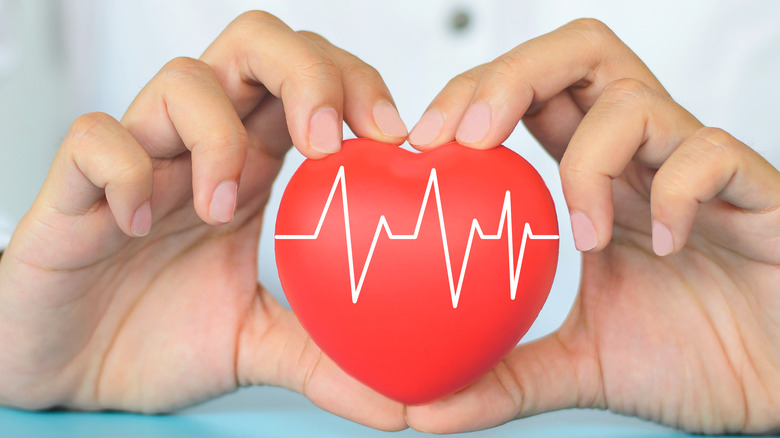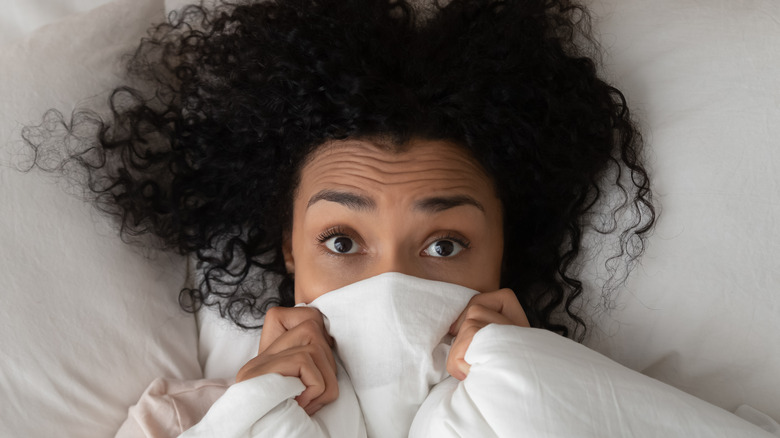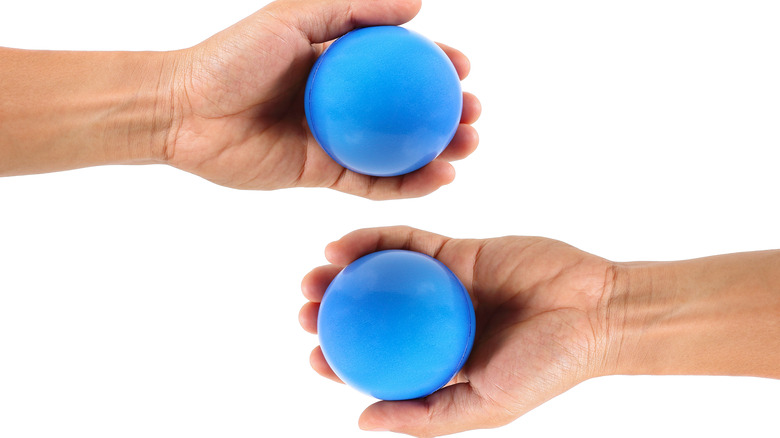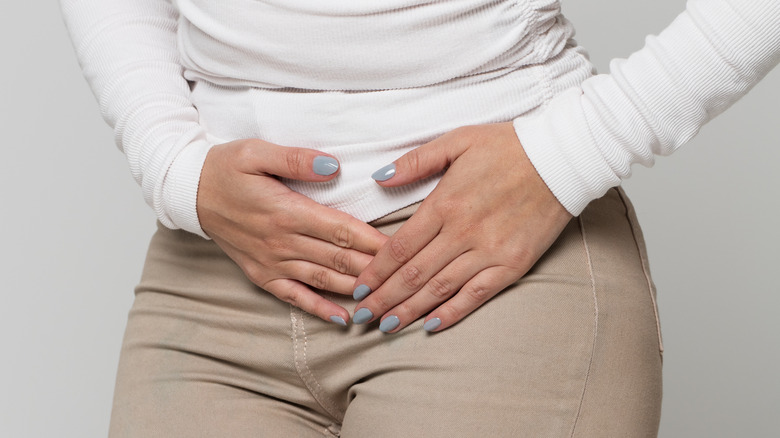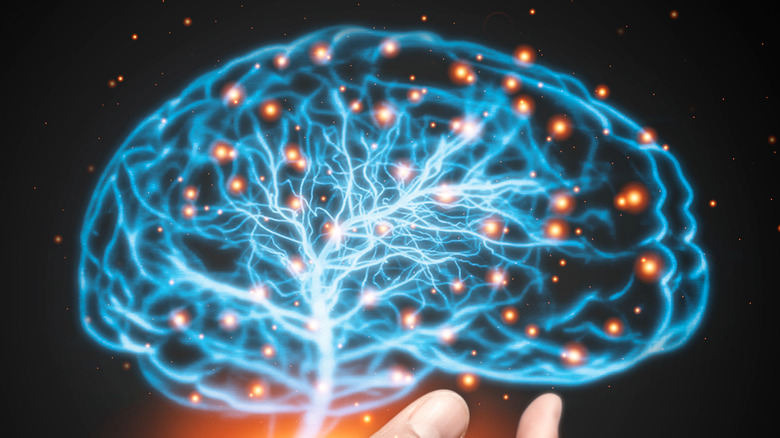Surprising Things That Happen To Your Body During Sex
Sex can be fun, pleasurable, help us bond with our partners, and can even help improve our self-esteem (via WebMD). There are many proven reasons why sex is good for our health and overall wellbeing, but have you ever stopped to think about the specific ways sex affects your body when you're in the middle of doing the deed? Probably not (and fair enough). For those who are curious about what happens to your body during sex, there is a wealth of science that explains the process from start to finish.
The journey our bodies take to the big "O" actually starts well before the act is initiated. The process is called the "Sexual Response Cycle," and has been documented by scientists since its initial discovery in 1966 (via WebMD). The 4 phases are described as excitement, plateau, orgasm, and resolution. While these 4 phases are pretty standard, WebMD explains that each human body is unique and sex doesn't always fit neatly into these 4 categories. One thing that's for sure is that within each of these phases, uniform things happen to the body that are unique to the sexual experience.
The vagina elongates
It might seem weird, but considering what happens during sex, it is rather logical. According to a 2005 study published by An International Journal of Obstetrics and Gynaecology, the average depth of the vagina is 3.77 inches, but MedicalNewsToday notes that other studies have suggested it can be anywhere between 3-7 inches in depth. During sex, all of that changes. As arousal occurs, blood rushes to the vagina, causing it to lengthen and the cervix to lift to accommodate a "penis, finger, or sex toy."
According to WebMD, studies that were conducted in the '60s measured an increase of up to an entire inch during arousal — but how are all of these changes even possible? According to Dr. Christine O'Connor, director of adolescent gynecology and well women care at the Mercy Medical Center, the vagina is actually very elastic. "It doesn't stay one particular size," O'Connor told the publication. "It changes to accommodate whatever is going on at that time." The vaginal walls have what are called "rugae," which makes them similar to the stomach in that they can expand and contract as necessary.
Your skin flushes
That red, flushed look that you experience mid- and post-sex is a real thing, and science has a perfect explanation for why it happens. Referred to as "sex flush," that red-pinkish look that you get on your skin is a part of the sexual response cycle. According to Healthline, it is most likely to first show up on the face, as well as on the chest and the back, typically appearing in blotches. It starts during the arousal phase of the sexual response cycle when blood begins to rush to certain areas of the body. The sex flush peaks at the orgasm phase of the cycle where your blood pressure, heart rate, and breathing are at an all-time high. It's at this point the flush may spread over the entire body.
The resolution phase is when the sex flush should disappear. If it doesn't and you are still experiencing redness, specifically in the genital area (and if you are experiencing burning, itching, or soreness), then it may be something else that's causing the "flush." Otherwise, Healthline explains that this phenomenon is completely normal and not a cause for concern. Enjoy your post-coital glow without worry.
Your genitals will swell
Perhaps this one seems obvious, but the science behind arousal and how our body responds to it might be news to you. This particular side effect of sex begins at — you guessed it — the excitement phase, which happens as a result of "sensory and mental stimulation," according to the Cleveland Clinic. For men, at this point in the arousal process, messages from the central nervous system will stimulate the genitals. The brain and more localized nerves cause the muscles to relax. This promotes blood flow to the penis to fill it up and it allows it to swell or expand, creating an erection.
For women, swelling of the genitals also occurs during the excitement phase of the sexual response cycle, which is also caused by a rush of blood "down under." "In females, this vascular flow results in clitoral engorgement and erection and accompanying vulvar swelling and vaginal [secretion] of fluid," Dr. Rachel N. Pauls of the Divisions of Female Pelvic Floor Medicine and Reconstructive Surgery at TriHealth/Good Samaritan Hospital, told MedicalNewsToday. "If a threshold is reached, orgasm can follow arousal. Activation of [nerve pathways] triggers pelvic floor skeletal muscle contractions that accompany sexual satisfaction."
Your heartbeat speeds up
Looking for a good cardio workout that doesn't require you to leave the bed? You're in luck. While it might not be the same as clocking in a 5K, your heartbeat does increase and a considerable amount of calories are burned during the average sex session. According to the Cleveland Clinic, the heart rate during sex can rise to 110-120 beats per minute (BPM) depending on whether the partner is on the bottom or the top, respectively. Compare that to the average resting heart rate of 60-100 BPM, and you can see your heart is definitely working harder for you during sex.
According to Healthline, sex counts as "mild to moderate physical activity," which can be compared to walking 2 flights of stairs or taking a walk. Although there are currently no studies to support the theory, going at it solo can also get your heart working a little faster than usual, which could lead to an improvement in cardiovascular health. If you have heart disease and are concerned about whether sex will negatively affect it, experts at the Cleveland Clinic say not to worry, and even encourage sex if you are fit enough.
Your pain threshold increases
No pain, no gain, right? Well, not when it comes to sex. One of the more surprising side effects of sex is that it can actually, in a way, distract you from feeling pain. In a pair of small studies published in Pain evaluating 10 women, it was discovered that vaginal self-stimulation significantly increased the threshold of pain tolerance without impacting the ability of the women to feel non-painful sensations. In the research, the women first used an external element to stimulate pleasure, and the data showed that the pain detection threshold increased by 53%. In the second part of the study where "pressure" was used to stimulate arousal, the pain detection threshold increased by 47.4%. Finally, when pressure was applied resulting in orgasm, the pain detection threshold increased by a whopping 106.7%.
So, the big question you're probably asking is why? According to science, endorphins, which are released in large amounts during sex, are the likely culprit. According to a 2010 study published in The Hawai'i Medical Journal, "Beta-endorphins are neuropeptides involved in pain management, possessing morphine-like effects, and are involved in natural reward circuits such as feeding, drinking, sex and maternal behavior."
Air gets pushed into the vaginal canal
You've probably heard this phenomenon called by its street name, the ever-elusive "queef." Dubbed for the unfortunate sound effect it creates, the queef, while embarrassing, is actually a pretty common side effect of sex. As with most things, perhaps knowing why it happens will provide you with some relief from potential embarrassment. Dr. Sarah Yamaguchi of DTLA Gynecology in Los Angeles spoke to Women's Health to explain the biology behind this phenomenon. "Queefing happens when air escapes from the vagina suddenly with enough volume to notice it," Dr. Yamaguchi told the publication. "A little bit of air can get pushed into the vagina, and it gets pushed out all at once sometimes."
Just in case this wasn't 100% clear yet, a queef is not the same as a fart, which is expelled out of the rectum because of "bacterial activity in the gut." As the vagina is penetrated by either a penis or other penetrative object, air is quickly displaced, which leads to its expulsion and the "fart-like" sound. If you are lucky enough to be getting it on, you will more than likely experience a queef at some point, and according to the publication, it is totally normal.
You breathe faster
Just like your heart rate and blood pressure increase during the different phases of sex, so does your breath. This side effect of sex occurs during the beginning phases of excitement during sex, and it's a physiological response that happens naturally (via Health). Dr. Barbara Bartlik, a psychiatrist and sex therapist, spoke to Health to explain how breathing can impact sex. She explains that while most women breathe fast and shallow during sex, and may even hold their breath while experiencing an orgasm, there is actually a way to "hijack" the automatic process to increase pleasure between you and your partner.
"All of this occurs automatically, without your even thinking about it," she told Health, in regards to rapid breathing. "To increase the intensity of your orgasm, deliberately take slow, deep breaths as you feel yourself becoming more and more aroused. By slowing everything down, you will delay your orgasm and build the pleasurable tension."
Your muscles tense up
While tense muscles don't sound like a good thing in most circumstances, it's actually very good during sex. According to Planned Parenthood, the muscles begin to tense as a response to external or mental stimuli during the excitement phase of the sexual response cycle, and this tension is typically released during orgasm. In fact, a certain amount of muscular tension is actually necessary to reach orgasm, according to WebMD. While the myth of "just relaxing" during sex is quite pervasive (particularly for women), tensing of the buttocks, abs, legs, and even feet can aid in achieving orgasm.
For men, WebMD explains that muscles at the base of the penis will tighten as they approach orgasm, which helps to facilitate ejaculation. Muscle tension is typically at the lowest at the beginning of the sexual response cycle, and then slowly increases during the second phase (plateau). This is when the testicles are actually pulled upwards. The orgasm is when muscle tension reaches its peak for both sexes, and the resolution (or the final phase) is when the muscles relax and turn back to their pre-sex state.
You experience a surge in happy hormones
It's no secret sex makes you happy. Whether it's because you're able to connect more deeply with your partner — or maybe it's just been a while — there are many potential reasons it'll have you smiling long after the deed is done. If you've ever stopped to wonder what exactly is going on in your brain and body that has you so jazzed up during and after sex, science has a rock-solid explanation for you, and it all has to do with a dizzying cocktail of chemicals and hormones.
According to The Healthy, sex triggers the brain to release high levels of a chemical called dopamine, which "promotes feelings of desire, euphoria, satisfaction, and reward." Dopamine is the same chemical responsible for that rewarding feeling when you eat a delicious slice of cake. In addition to dopamine, oxytocin, also known as the "love hormone," is released in significant amounts both during arousal and orgasm. According to Healthline, oxytocin is known to promote feelings of trust, relaxation, and improved mental health. The last in the trio of happy chemicals is serotonin, which can lead to happy and peaceful feelings after sex.
Your muscles start convulsing
No need to call a priest for an exorcism — it's just another side effect of some good old-fashioned s-e-x. During the third phase of the sexual response cycle, the muscles in the uterus, vagina, and anus all contract at once for women during orgasm. "During orgasm the muscles in the vagina, anus, and uterus contract and then release, producing those waves of pleasure that feel so great," Dr. Laura Deitsch, Vibrant's resident sexologist and licensed clinical professional counselor, explained to Bustle.
According to Everyday Health, for men, the muscles that were once tense in the penis experience "rapid-fire contractions" around the base of the shaft and around the anus that assist in ejaculation during orgasm. They may also experience involuntary pelvic thrusting during this phase in the cycle as well. Furthermore, according to Bustle, other muscles in the body, including the "legs, feet, or face," may contract involuntarily as well.
Your testicles swell in size
According to WebMD, during the excitement phase of the sexual response cycle, testicle size increases due to what's called "vasocongestion," which is essentially a rush of blood to the pelvic area. Although it might sound painful, or in the very least uncomfortable, this is yet another natural side effect of sex that is typically no cause for concern. Not only does the skin of the scrotum thicken, but the testicles increase by a whopping 50% in size. More so, the sex scientists who discovered the sexual response cycle, William H. Masters and Virginia E. Johnson, found that some men who are able to sustain arousal for longer can actually experience a doubling in the size of their testicles during sex.
The only time this expansion might cause discomfort is if a man fails to ejaculate, leading to what is colloquially referred to as "blue balls." According to MedicalNewsToday, blue balls, or epididymal hypertension, refers to the painful sensation in the testicles after blood has flooded the area and remained there for an extended period of time. This condition isn't serious, and either masturbating to achieve ejaculation or distracting yourself with something else can help reduce pain.
Your breasts enlarge and become more sensitive
Have you ever been in the throes of passion, looked down at your chest, and thought, "Wow, my breasts are looking more voluptuous than usual right now"? If so, it wasn't your imagination, and there is a biological reason for the sudden increase in size. Carol Queen, staff sexologist at Good Vibrations, spoke to Bustle to explain how breasts, which are considered an erogenous zone, actually increase in sensitivity during sex. "Breast and nipple touch — including with the mouth or sex toys — can feel more intense, more sexual/erotic, and other ways during sex play. These are all effects of arousal since bodily changes during arousal tend to strongly affect blood flow, our neurology, and our muscles," she explained to the site.
In terms of them growing in size, Queen explained to Bustle that during the plateau phase of the sexual response cycle, blood is pumping extra hard and goes to the breasts, essentially engorging them in preparation for orgasm. Alternatively, Queen explains that if the breasts become overly sensitive during this phase, it's actually possible for them to start hurting if there is too much direct stimulation. In this case, it's best to lighten up the touch.
Bacteria can make its way into your urethra
Perhaps one of the more unfortunate side effects of sex is experiencing a urinary tract infection (UTI). Perhaps considered a sexual rite of passage for some, urinary tract infections are rather common, and affect at least 50-60% of women at least once in their lifetime, according to Healthline. So how are sex and UTIs connected? "During sexual intercourse, thrusting can introduce bacteria up the urethra and into the bladder, increasing the risk of a UTI," OB-GYN Dr. Lakeisha Richardson told Healthline.
Women are more prone to UTIs because of their shorter urethras, which creates an easier pathway for bacteria to reach the bladder. For women, the proximity of the urethra to the anus is another easy pathway for bacteria to find their way to the bladder. Urinating after sex is one of the prime ways to prevent infection, because as Richardson explains, "Eliminating any bacteria in the bladder after sex decreases the risk of a UTI." Another way to help prevent UTIs is by cleansing the genitals before sex to clear the area of any potential bacteria.
Parts of your brain shut off
If you're looking for a way to take your mind off the stressors to the world, or maybe even feel a little bolder or less inhibited, why not give sex a try? According to Business Insider, studies have been done on the brain using Functional Magnetic Resonance Imaging machines, or fMRI scans, to monitor brain activity during sex. Clinical psychologist Daniel Sher spoke to the publication and explained some of the surprising ways your brain changes as you're getting it on. "The lateral orbitofrontal cortex becomes less active during sex," Sher told the publication. "This is the part of the brain that is responsible for reason, decision making, and value judgments. The deactivation of this part of the brain is also associated with decreases in fear and anxiety."
Furthermore, clinical psychologist Jennifer Sweeton explained to The Healthy that in women, parts of the brain shut off that regulate "social judgments and awareness." Regions that are responsible for "self-awareness and inhibitions" also shut off during sex for women, which can in turn help them relax enough to achieve orgasm.





